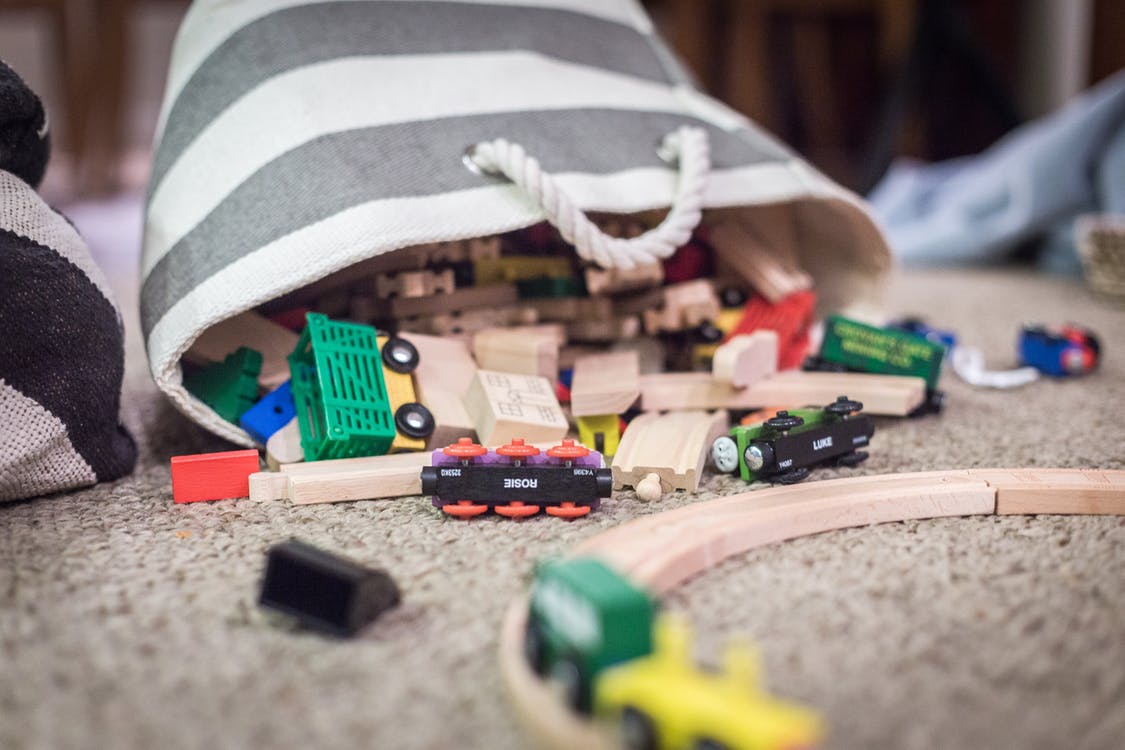Minimalism is more than just a trend or fad—it’s a lifestyle. It’s one that many parents have adopted not only for themselves, but as a way of raising their children. Minimalism can teach adults and kids alike how to appreciate the smallest and simplest of good things that come their way, and it can help all of us lead lives that truly align with our values.
Minimalism can look different for everyone, so it’s more important to determine what the priorities are for your life, your home, and your family situation before you tackle the physical aspects.
[vc_separator type=’normal’ position=’center’ color=” thickness=’.5px’ up=’25’ down=’40’]
Naming What Is Important to You and Your Family

Let’s say you’ve decided to live a more minimal lifestyle, and you’d like to teach your kids and family to do the same. The first thing to decide is WHY you want to do this. Do you want to help your kids learn gratitude? Keep your house tidy and free of unnecessary clutter? What is it about paring down your belongings that is valuable to you, and why?
In essence, you’ll have a hard time teaching your children about something you don’t fully have an explanation for yourself! So, dig deep and figure out your “why” before you make any changes in your lifestyle. Once you’re clear about your own values and beliefs, you can be more deliberate about creating a family culture and a home environment that promotes those ideas.
[vc_separator type=’normal’ position=’center’ color=” thickness=’.5px’ up=’25’ down=’40’]
How Do I Use Minimalism in Parenting?
Simply put, kids learn by watching what adults do—and your actions will say a lot about what you believe is important. If you’re preaching minimalism to your children, and then overbuying or never editing down your own belongings, chances are good that your children just won’t grasp why simple living or mindful purchasing is important. You’re creating a classic example of “do as I say, not as I do,” which, to be blunt, isn’t going to get the results or behavioral changes you’re looking for.
Instead, model the type of lifestyle you want your children to lead, but then take it one step further to show them WHY you live the way you do. If you’re out shopping with your kids and they ask you to buy something for them, take the opportunity to start a conversation with them. When my daughter was young, I remember a specific instance where she had seen a cheap toy in a TV commercial at a friends house. She and I were at a home store to purchase something else, and she saw this toy near the checkout line. Of course, she asked me to buy it for her.
At this point, I had a few options:
- Tell her “no,” and set up a situation where it becomes a battle over something that is “forbidden”.
- Tell her “no,” but explain that I was choosing not to buy that for her because I didn’t believe it was valuable or well-made and would just become clutter.
- Buy it for her, and say in the moment, “Let’s see if it’s just as cool as it looked on TV.”
That day, I was feeling adventurous, so I chose option 3 though with a caveat (from option 2 about how things often are as awesome as they appear on tv). Within a couple of hours of getting home, I remember her telling me, “That was a stupid purchase. This thing sucks. Why did you let me get that?” Of course, not every situation is going to end like that, but to me, that was a parenting victory. One way or another, I wanted (and still do want!) my daughter to learn that “stuff” doesn’t always make our lives better, and it’s easy to fall into the consumerist trap that says more stuff equals more happiness.
Sometimes, our kids have to experience something like that for themselves. For that reason, it could be a good idea to give your kids a small amount of money to spend however they want to. If you watch carefully, after a few times of buying clothes, toys, or other cheap items, odds are good that they’ll figure out the ramifications of buying more and more stuff on their own and how to make better decisions. Start an honest and loving conversation about a purchase they regret, rather than shaming them and saying “I told you so.”
It’s not that some purchases won’t turn out to be good ones. As a parent, part of my job is to teach my daughter how to think about purchases and be mindful about her space and her money. So having a ‘win’ in the purchasing arena can be great too – especially if it was a thought out purchase that was needed and useful (or just made her supremely happy!).
[vc_separator type=’normal’ position=’center’ color=” thickness=’.5px’ up=’25’ down=’40’]
Getting Past the Obstacles
If your family existed in a bubble with no other outside people or influences, minimalism would be a breeze. Unfortunately, that’s not how life works. There are people who love to give gifts to your kids, and there’s an entire world chock-full of media and advertising trying to convince our kids to buy as much “stuff” as they possibly can. So how do you counteract these barriers to minimalism?
Specifically, you can teach your kids the truth about advertising. Marketers and advertisers are out to make products look amazing, and it’s important that your kids learn to see through advertising claims. Personally, I’ve sat down with my daughter and watched those videos that breaks down the amount of makeup, hair products, and Photoshop tweaking that goes into one photo for an ad. We’ve also discussed the lies we see in the media – at least ones we’ve noticed! Advertising can deceive us into purchasing things, but being armed with truth is a great way to make more mindful purchases.
Dealing with people who love to bring gifts to your children can be a bit more difficult. But, there are some ways to address this without hurting feelings. Instead of going on a tirade about why your family doesn’t want any more stuff coming into your house, kindly thank people for their generosity, and then you can navigate whether or not to keep an item with your children in private. In recurring situations, you can also suggest alternatives for holidays or birthdays. Instead of exchanging gifts with grandparents or other family members, suggest that gift-buying money be put toward a family trip or day-long outing together instead. For events like birthday parties – set the expectation in the invitation (and the inevitable follow up call about what the child wants) that physical gifts are not expected or wanted because the preference is donations to a local charity or an experience rather than a toy. This can not only slow down the influx of stuff, but it will give you and your children an opportunity to make lasting memories with the people you love.
[vc_separator type=’normal’ position=’center’ color=” thickness=’.5px’ up=’25’ down=’40’]
Implementing Minimalist Habits in Your Family
No matter what minimalism looks like for you, your family, or your children, remember that this lifestyle change is a long process. Getting rid of clutter and making more mindful purchases will lead you to less cleanup, less need for storage space, and more time to spend with people you love, but this shift won’t happen overnight. Start with yourself, and involve your family in your own lifestyle changes. Soon, you’ll be able to teach positive habits to your children and build the mindful family culture you’re hoping for—one day, one conversation, and one moment at a time.
If you and your family are ready to start living simply, A Fresh Space can help. Contact us for help in clearing the clutter and making time and space for what truly matters to you!
[vc_separator type=’transparent’ position=’center’ color=” thickness=’.5px’ up=’100′ down=”]




